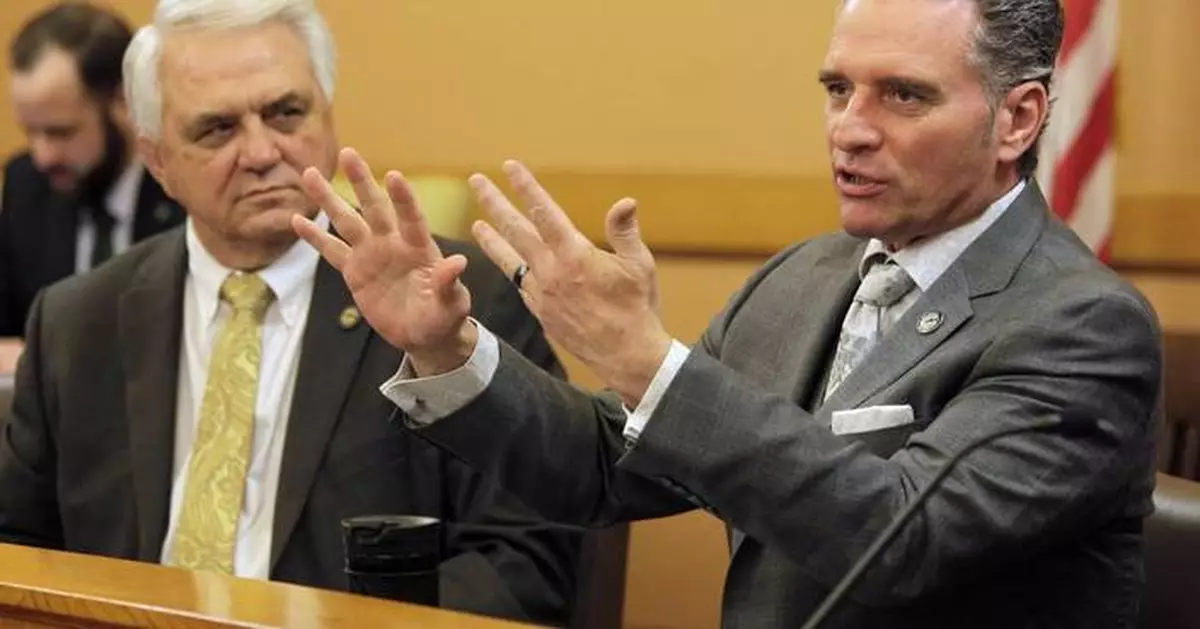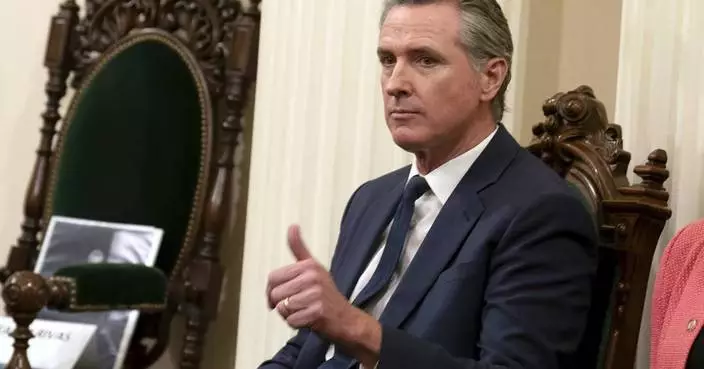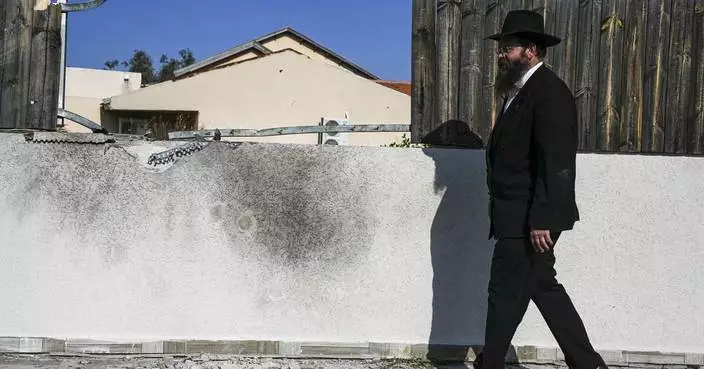TOPEKA, Kan. (AP) — The Kansas Legislature is scrambling to address tax cuts, funding for disability services and immigration issues ahead of its annual three-week spring break starting next week. Most bills that don’t pass by then won’t be considered when lawmakers return April 29 for a short wrap-up session.
Republicans disagree over how to cut income taxes, as well as pay for other big-ticket items such as disability rights. It's all coming to a head as lawmakers approach their annual “Drop Dead Day,” a deadline to either pass legislation or let it fade away.
Click to Gallery
Kansas Sen. Virgil Peck, R-Havana, right, confers with Sen. Molly Baumgardner, R-Louisburg, during the Senate's session, Wednesday, March 27, 2024, at the Statehouse in Topeka, Kan. Senators have included provisions in their proposed state budget on immigration and diversity, equity and inclusion initiatives at state universities. (AP Photo/John Hanna)
Kansas Senate President Ty Masterson, R-Andover, confers with House Appropriations Committee Chair Troy Waymaster, R-Bunker Hill, and Senate Ways and Means Committee Chair Rick Billinger, R-Goodland, right, during the Senate's session, Wednesday, March 27, 2024, at the Statehouse in Topeka, Kan. Waymaster and Billinger are the lead negotiators for their chambers as they settle their differences on a proposed $25 billion state budget. (AP Photo/John Hanna)
Kansas state Rep. Will Carpenter, left, R-Winfield, confers with two House Appropriations Committee members, Rep. Stephen Owens, center, R-Hesston, and Susan Concannon, R-Beloit, during a House session, Wednesday, March 27, 2024, at the Statehouse in Topeka, Kan. Carpenter has been pushing to increase the state's spending on in-home and community services for disabled to shrink waiting lists for those services. (AP Photo/John Hanna)
Kansas Senate President Ty Masterson, right, R-Andover, briefly discusses tax issues with fellow Republican senators as Majority Leader Larry Alley, left, R-Winfield, watches, Wednesday, March 27, 2024, at the Statehouse in Topeka, Kan. Legislators expect to pass a plan for cutting taxes, but Republicans have to decide whether they will drop a proposal to move Kansas to personal income tax rate from the current three. (AP Photo/John Hanna)
Kansas Sen. Virgil Peck, R-Havana, right, confers with Sen. Molly Baumgardner, R-Louisburg, during the Senate's session, Wednesday, March 27, 2024, at the Statehouse in Topeka, Kan. Senators have included provisions in their proposed state budget on immigration and diversity, equity and inclusion initiatives at state universities. (AP Photo/John Hanna)
Kansas Senate President Ty Masterson, R-Andover, confers with House Appropriations Committee Chair Troy Waymaster, R-Bunker Hill, and Senate Ways and Means Committee Chair Rick Billinger, R-Goodland, right, during the Senate's session, Wednesday, March 27, 2024, at the Statehouse in Topeka, Kan. Waymaster and Billinger are the lead negotiators for their chambers as they settle their differences on a proposed $25 billion state budget. (AP Photo/John Hanna)
Kansas state Rep. Nick Hoheisel, R-Wichita, watches an electronic tally board as the House votes on legislation, Wednesday, March 27, 2024, at the Statehouse in Topeka, Kan. The Kansas House has a new plan for cutting taxes and has backed off a previous GOP proposal for a "flat" personal income tax with a single rate rather than the current three rates. (AP Photo/John Hanna)
Kansas state Rep. Will Carpenter, left, R-Winfield, confers with two House Appropriations Committee members, Rep. Stephen Owens, center, R-Hesston, and Susan Concannon, R-Beloit, during a House session, Wednesday, March 27, 2024, at the Statehouse in Topeka, Kan. Carpenter has been pushing to increase the state's spending on in-home and community services for disabled to shrink waiting lists for those services. (AP Photo/John Hanna)
Kansas Senate President Ty Masterson, right, R-Andover, briefly discusses tax issues with fellow Republican senators as Majority Leader Larry Alley, left, R-Winfield, watches, Wednesday, March 27, 2024, at the Statehouse in Topeka, Kan. Legislators expect to pass a plan for cutting taxes, but Republicans have to decide whether they will drop a proposal to move Kansas to personal income tax rate from the current three. (AP Photo/John Hanna)
Lawmakers are supposed to finish a proposed $25 billion budget for the fiscal year beginning July 1.
Here is a look at some of the major issues up for consideration this week:
The Legislature is having its second go at enacting income, sales and property tax cuts this year after Democratic Gov. Laura Kelly vetoed a GOP package in January because it included a single-rate, or “flat,” income tax, which she said favored the “super rich.” With help from several GOP defectors, Democrats narrowly stopped the governor's veto from being overridden in the House.
State tax collections have fallen short in recent months, but Kansas is still on track to end June 2025 with more than $4 billion in surplus funds. Legislators are poised to approve tax cuts worth $500 million to $600 million annually, while a plan Kelly outlined in January would be worth about $300 million a year.
The House and Senate both want to exempt retirees' Social Security benefits from income taxes, decrease the property taxes levied by the state for public schools and adjust standard personal income tax deductions.
The key difference is in proposed income tax rates.
A Senate plan would set a single rate of 5.7% — the top rate now — and decrease it over five years to 5.45%.
In the House, GOP leaders concluded a single-rate plan is unlikely to overcome another Kelly veto. Instead, they want to eliminate the lowest income tax bracket and set the top rate at 5.65%.
Kelly hasn't said publicly whether she would accept a plan with two rates.
While Senate Republicans appear to have a two-thirds majority for their plan, the House approved its version this week 123-0. The final tax plan will be drafted by three Senate and three House negotiators.
Immigration and diversity issues are both part of this year's budget negotiations in Kansas.
Republican senators have added a provision to their spending plan that would support Texas Gov. Greg Abbott's battle with the Biden administration over border security. The measure sets aside $15.7 million for a proposed border mission before July and directs Kelly to deploy Kansas National Guard resources to help Texas.
Asked about that provision last month, Kelly said the state constitution makes her the guard's commander-in-chief, “And I make those decisions.”
Another provision in the Senate budget proposal would withhold $35.7 million from state universities until top administrators go before Kelly and legislative leaders and renounce certain diversity, equity and inclusion initiatives. The lawmakers want schools to declare they won't require prospective students or job applicants to commit to DEI principles or require them to discuss their experiences with DEI programs.
Last year, Kelly vetoed two anti-DEI budget provisions. One would have prevented state universities from using DEI principles in hiring. The other would have barred the state board that licenses mental health professionals from requiring or incentivizing them to undergo training in diversity or anti-racism theories.
Some Kansas families are waiting 10 years to get in-home or community services for their children with physical or intellectual-developmental disabilities. Lawmakers are weighing solutions.
While 15,000 disabled Kansans have access to services such as day programs, employment assistance or home care, more than 7,600 are on waiting lists. A total of 23 people died in 2022 and 2023 while waiting for services, according to the Kansas Department for Aging and Disability Services.
Kelly now proposes spending $23 million to provide services for 250 physically disabled people and 250 with intellectual-developmental disabilities who are now on waiting lists. The House proposal would double that.
Some House Democrats have pushed unsuccessfully to spend enough to service an additional 1,000 people with intellectual or developmental disabilities. Yet some Republicans question whether service providers can handle such an increased workload.
“It is disingenuous to tell them they’re going to get help when we can’t even find the workers to provide the services that they need,” House Health Committee Chairperson Brenda Landwehr, a Wichita Republican, said during a recent meeting.
But advocates for the disabled have questioned whether another 500 slots for people with intellectual or developmental disabilities will even shrink their waiting list, given that hundreds more individuals were added to it in each of the last two years.
Rocky Nichols, executive director of the Disability Rights Center of Kansas, argues providers will build the capacity if the state commits more money.
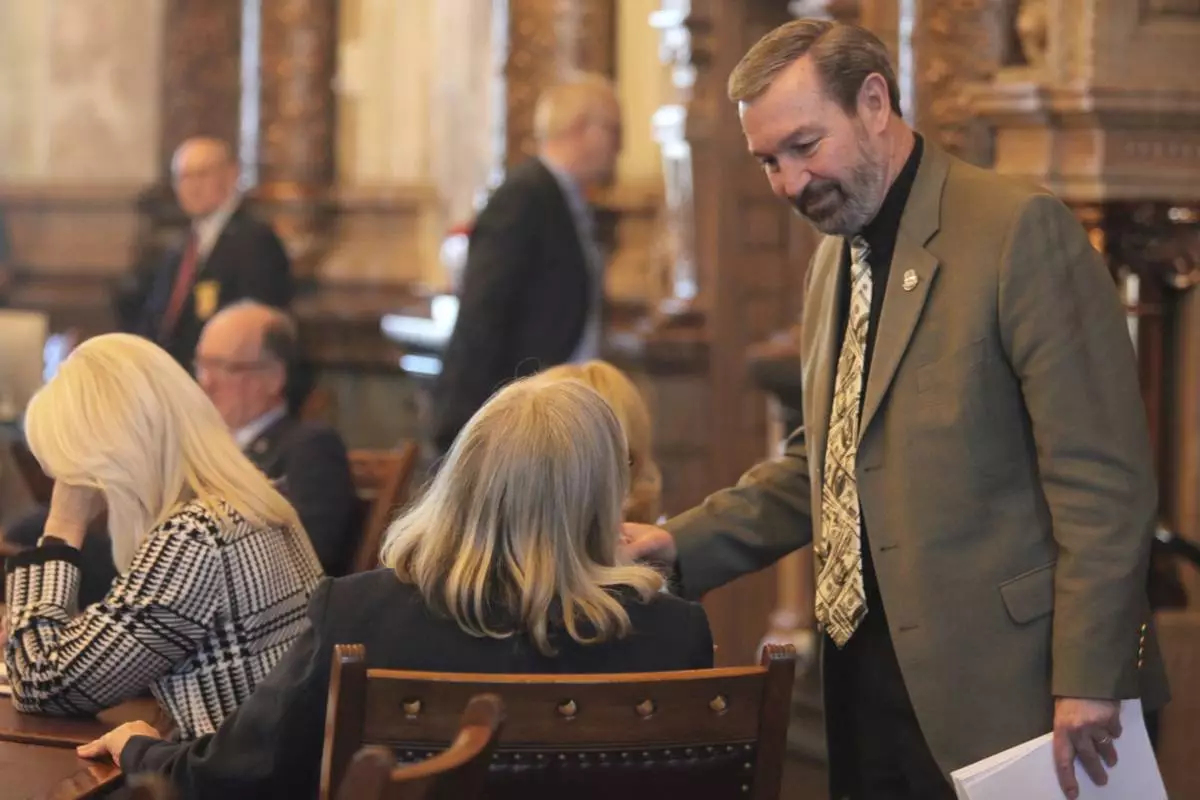
Kansas Sen. Virgil Peck, R-Havana, right, confers with Sen. Molly Baumgardner, R-Louisburg, during the Senate's session, Wednesday, March 27, 2024, at the Statehouse in Topeka, Kan. Senators have included provisions in their proposed state budget on immigration and diversity, equity and inclusion initiatives at state universities. (AP Photo/John Hanna)
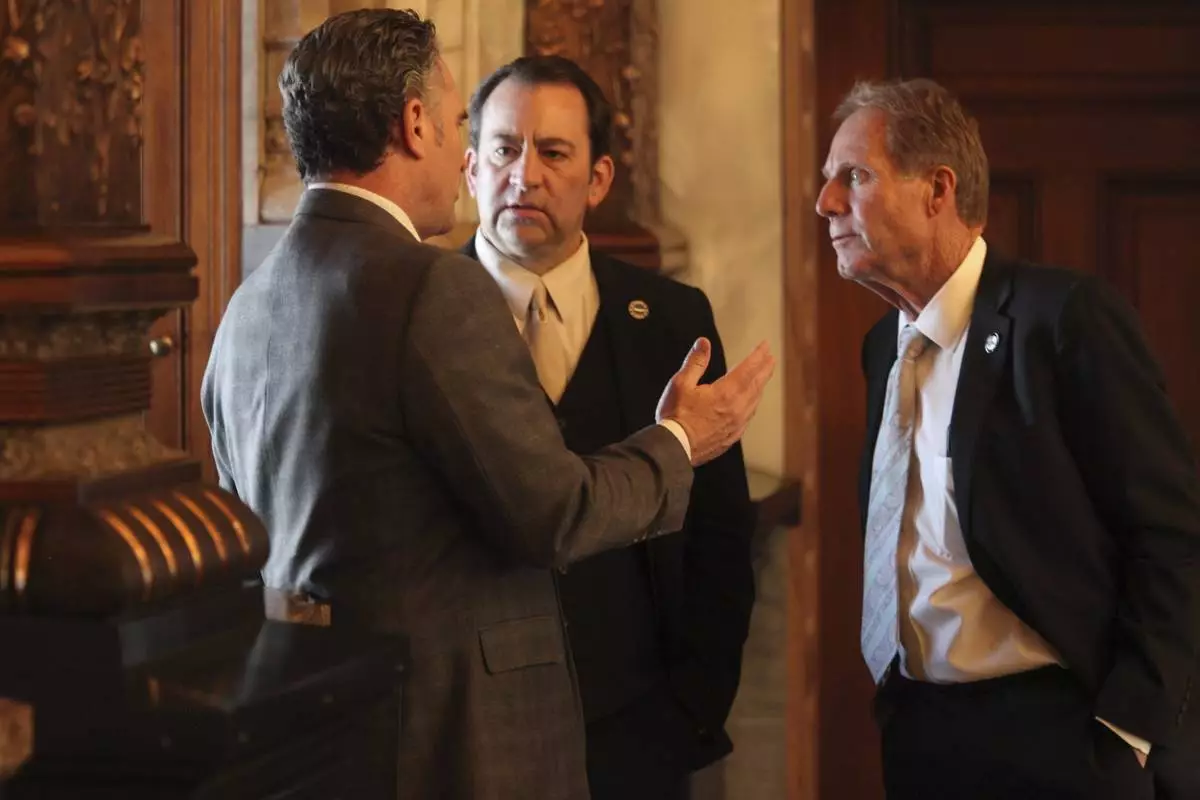
Kansas Senate President Ty Masterson, R-Andover, confers with House Appropriations Committee Chair Troy Waymaster, R-Bunker Hill, and Senate Ways and Means Committee Chair Rick Billinger, R-Goodland, right, during the Senate's session, Wednesday, March 27, 2024, at the Statehouse in Topeka, Kan. Waymaster and Billinger are the lead negotiators for their chambers as they settle their differences on a proposed $25 billion state budget. (AP Photo/John Hanna)
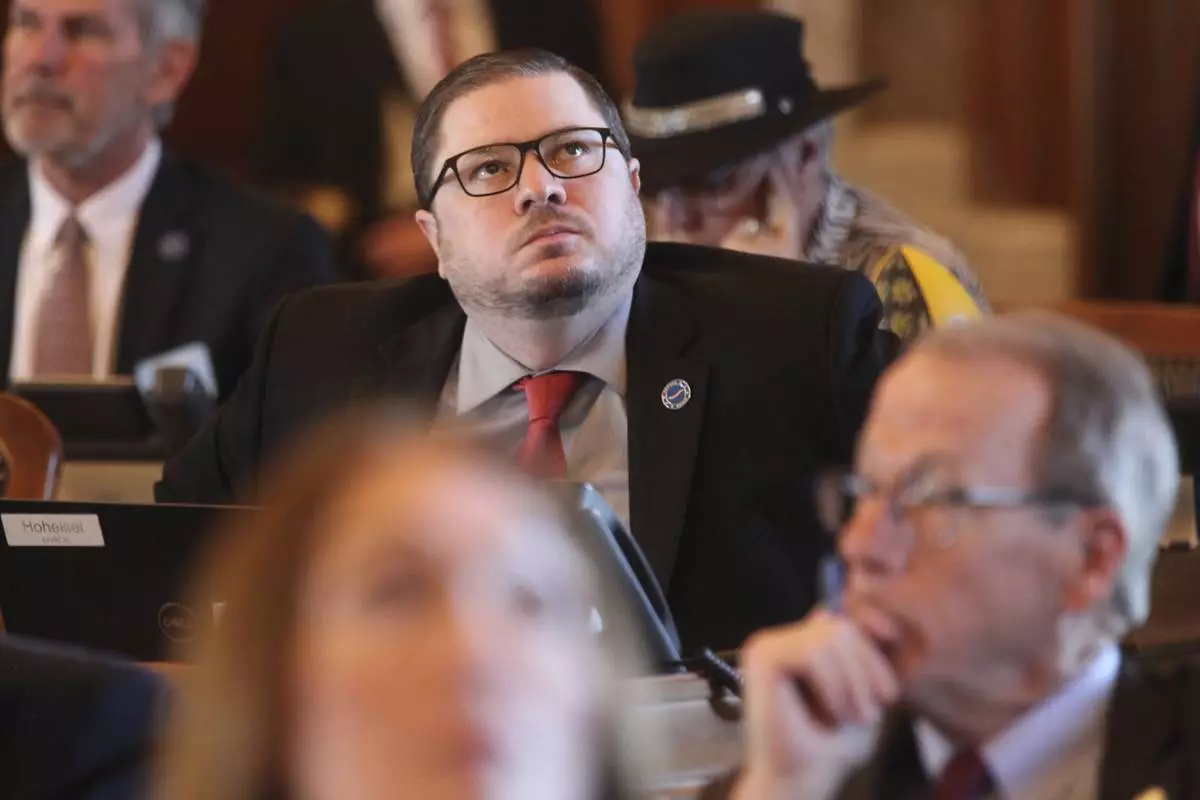
Kansas state Rep. Nick Hoheisel, R-Wichita, watches an electronic tally board as the House votes on legislation, Wednesday, March 27, 2024, at the Statehouse in Topeka, Kan. The Kansas House has a new plan for cutting taxes and has backed off a previous GOP proposal for a "flat" personal income tax with a single rate rather than the current three rates. (AP Photo/John Hanna)
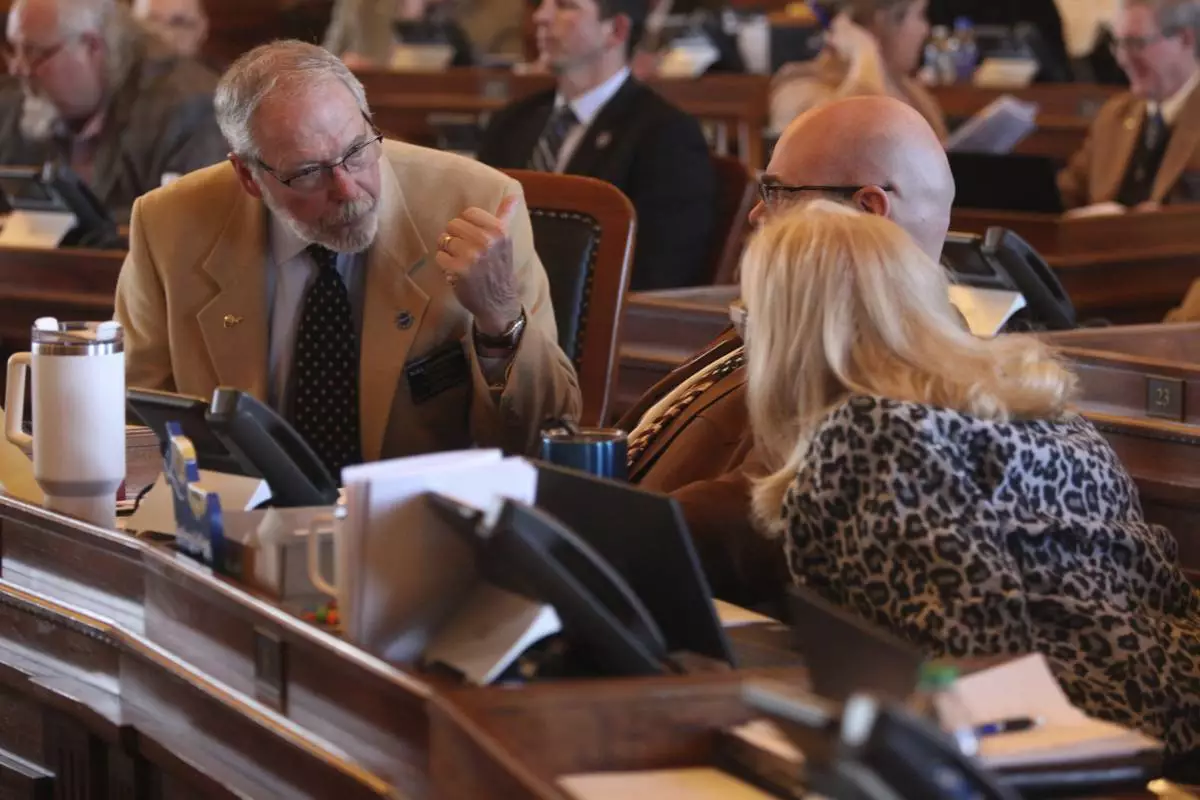
Kansas state Rep. Will Carpenter, left, R-Winfield, confers with two House Appropriations Committee members, Rep. Stephen Owens, center, R-Hesston, and Susan Concannon, R-Beloit, during a House session, Wednesday, March 27, 2024, at the Statehouse in Topeka, Kan. Carpenter has been pushing to increase the state's spending on in-home and community services for disabled to shrink waiting lists for those services. (AP Photo/John Hanna)
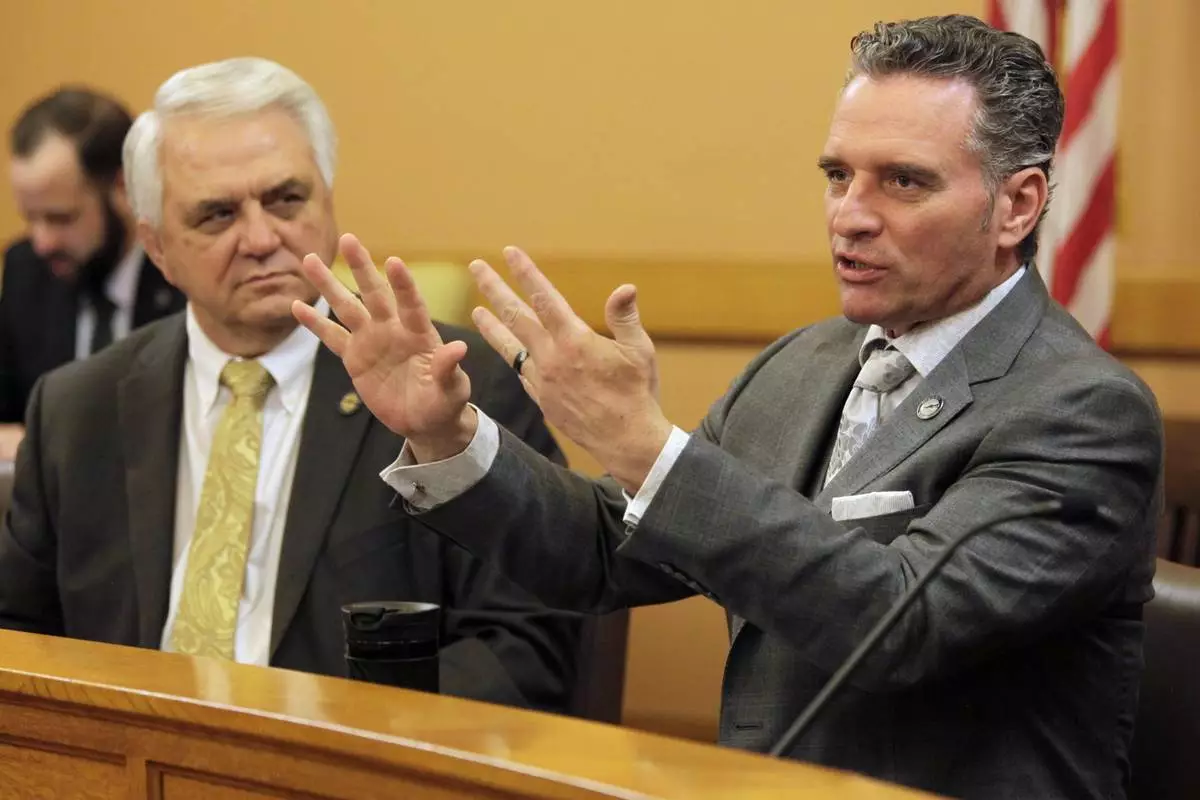
Kansas Senate President Ty Masterson, right, R-Andover, briefly discusses tax issues with fellow Republican senators as Majority Leader Larry Alley, left, R-Winfield, watches, Wednesday, March 27, 2024, at the Statehouse in Topeka, Kan. Legislators expect to pass a plan for cutting taxes, but Republicans have to decide whether they will drop a proposal to move Kansas to personal income tax rate from the current three. (AP Photo/John Hanna)
HARRISBURG, Pa. (AP) — Pennsylvania lawmakers on Tuesday returned Democratic Speaker Joanna McClinton to lead the chamber for the new session after the Republican floor leader bowed out to resolve a deadlock.
Democrats won 102 seats in November, a single-vote majority, but one of their members was absent from swearing-in day after suffering a health crisis.
"My question to each of you distinguished colleagues is, what will you be remembered for?" McClinton said after taking the oath of office.
In the initial vote for speaker, Republican Leader Jesse Topper and McClinton each garnered 101 votes. Topper removed himself from consideration and McClinton, of Philadelphia, prevailed on the second ballot on a voice vote.
Rep. Matthew Gergely had a “medical emergency over the holidays requiring hospitalization,” according to Beth Rementer, the House Democratic caucus spokesperson. She said he is not expected to return “for some time.”
Gergely’s absence, the close House margin and Republican control of the Senate could complicate first-term Democratic Gov. Josh Shapiro’s hopes of getting things done this year. Democrats had the same 102-101 majority in the last session, and other than the two annual budgets, little substantial legislation was enacted.
Democrats won chamber control two years ago and successfully defended it while several vacancies arose and were filled by special elections. In November, not one of the 203 House seats changed parties, meaning Democrats retained majority control by the slimmest of margins.
House Democratic Leader Matt Bradford of Montgomery County thanked Topper, who drew a standing ovation, as Bradford acknowledged the close margin, telling colleagues “we need to be humble and we need to be wise.”
In floor remarks, Topper wished Gergely a full and speedy recovery.
"There are very few days in this job that are not difficult," Topper said, urging members to feel gratitude for the opportunity to serve and to avoid becoming frustrated or cynical. “We see many of those who we represent not on their best day, but on their worst.”
House Republicans changed leadership since November, turning to Topper of Bedford County to be their floor leader. A former ranking member on the Education Committee, Topper succeeded Rep. Bryan Cutler, a former House speaker and caucus leader who remains in the House after being reelected in a Lancaster County district.
Topper told reporters after the session that he negotiated several changes to House rules, putting more minority party members on committees, requiring an additional “yes” vote for bills to get out of committee and parliamentary changes.
House Democrats meanwhile have five new members after Reps. Mike Sturla of Lancaster County and former House Speaker Mark Rozzi of Berks County retired; Reps. Patti Kim of Dauphin County and Nick Pisciottano of Allegheny County relinquished their seats to make successful runs for state Senate; and Rep. Kevin Boyle of Philadelphia lost in the spring primary.
House Republicans saw Rep. Dawn Keefer win a state Senate seat in York County and Rep. Ryan Mackenzie unseat Democratic U.S. Rep. Susan Wild.
In other GOP caucus changes, Rep. Rob Mercuri didn't seek reelection while running unsuccessfully for Congress in Allegheny County. Reps. Jim Gregory of Blair County and Mike Cabell of Luzerne County lost in the spring primary and six others didn't run again: Donna Oberlander of Clarion County, Jim Marshall of Beaver County, Aaron Kaufer of Luzerne County, George Dunbar of Westmoreland County, Paul Schemel of Franklin County and Barry Jozwiak of Berks County.
In the state Senate, Republican Joe Picozzi unseated freshman Democratic Sen. Jimmy Dillon in a Philadelphia district. Because Kim flipped a redistricted Harrisburg area seat, Republicans still control the chamber by the same margin, 28-22. But there is currently one Senate vacancy: Sen. Ryan Aument, a Lancaster Republican, resigned at the end of December to take a top staff job with incoming U.S. Sen. Dave McCormick.
On Tuesday, a special election to fill Aument's seat was scheduled to be held on March 25.
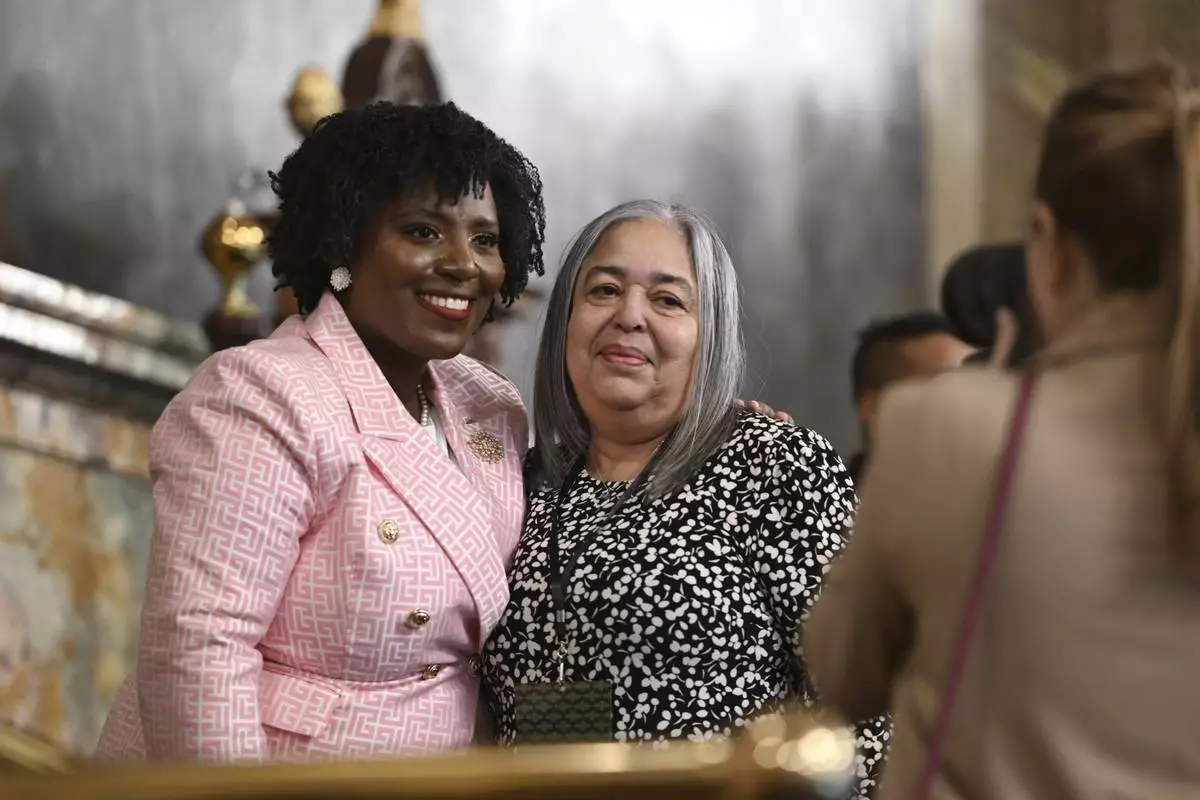
Pennsylvania state Rep. Joanna McClinton, D-Philadelphia, poses for a photo with a well-wisher after the chamber's members elected her as House speaker for the new two-year legislative session, Tuesday, Jan. 7, 2025, in Harrisburg, Pa. (AP Photo/Marc Levy)
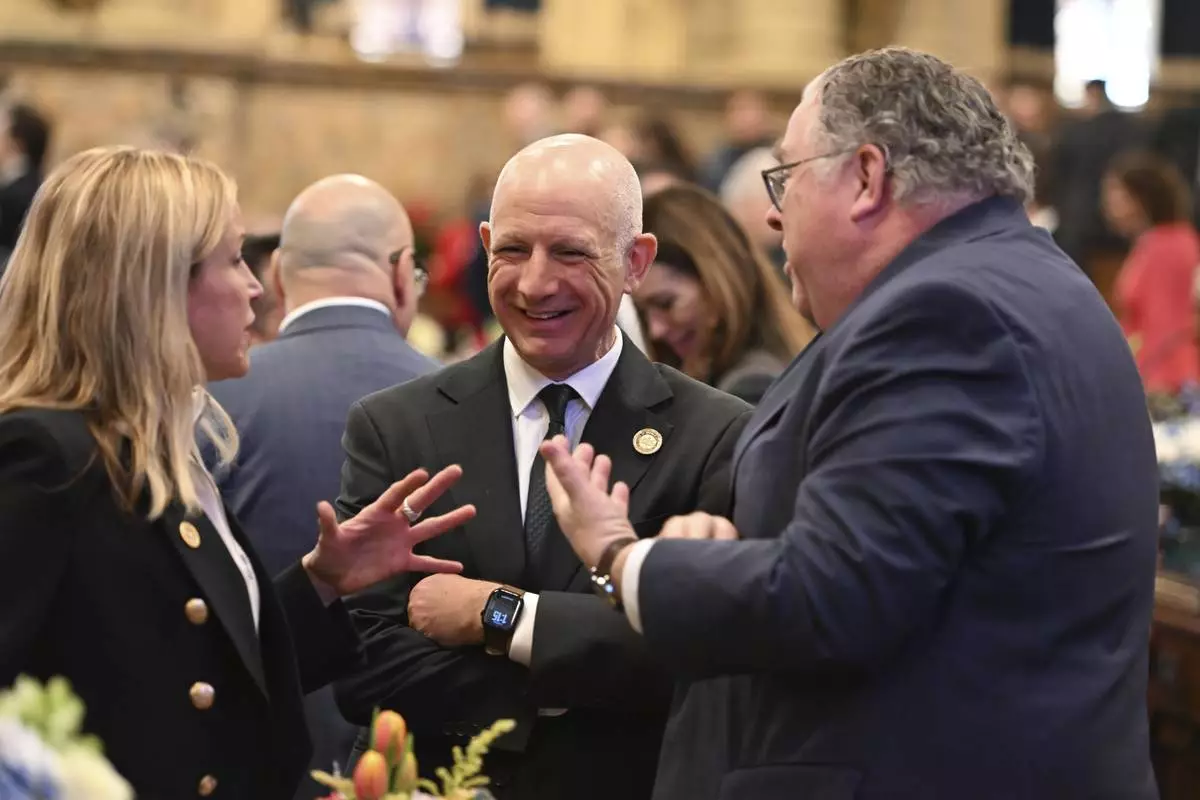
Pennsylvania state Reps. Melissa Shusterman, Dan Miller and Tim Briggs talk during a break in the chamber's opening session of the new two-year legislative session, Jan. 7, 2025, in Harrisburg, Pa. (AP Photo/Marc Levy)
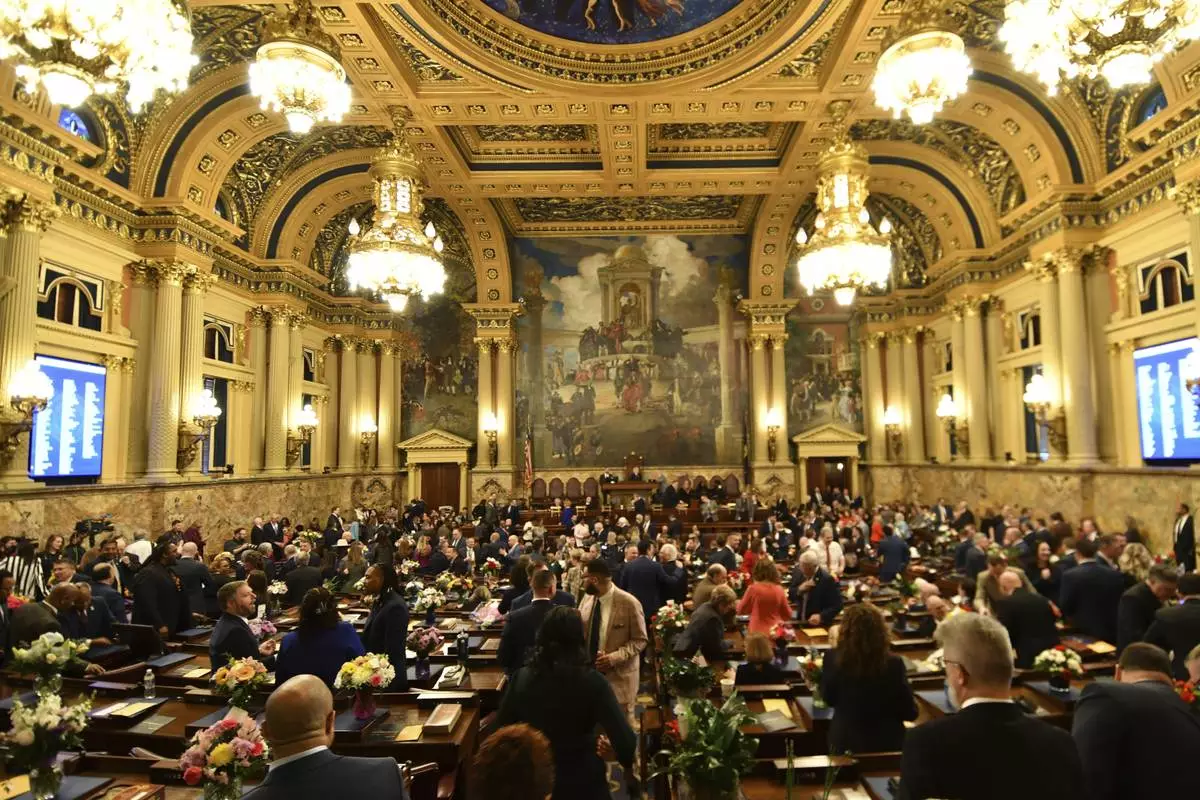
Members of the Pennsylvania House of Representatives gather with family members to be sworn in, elect a speaker and begin the new two-year legislative session, Jan. 7, 2025, in Harrisburg, Pa. (AP Photo/Marc Levy)
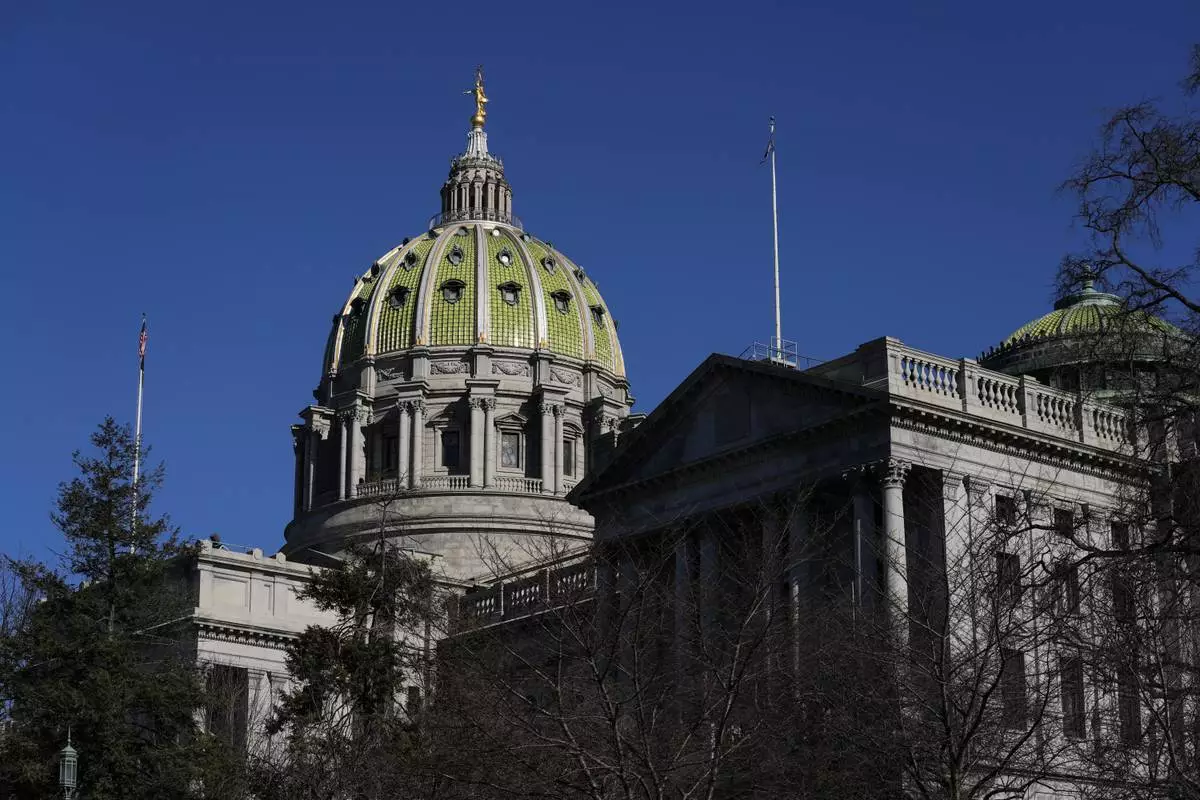
FILE - The Pennsylvania Capitol is seen, Feb. 6, 2024, in Harrisburg, Pa. (AP Photo/Matt Rourke, File)







